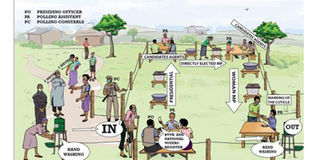How to vote safely in the Covid-19 pandemic

What you need to know:
The EC says the procedures are meant to protect voters from contracting Covid-19 at the polling stations and allow for a free and fair election
As Ugandans go to the polls this morning, the Electoral Commission (EC) has unveiled the procedures that must be followed and items a voter should have to be allowed to cast the ballot.
The EC says the procedures are meant to protect voters from contracting Covid-19 at the polling stations and allow for a free and fair election.
“We are going to find a changed polling station. Voters will not be allowed to access the stations without wearing face masks and the masks shouldn’t be used as a campaign material; so don’t come with a facemask having pictures of the candidate,” Mr Paul Bukenya, the acting EC spokesperson, said yesterday.
The government had said it would distribute 33 million masks to all Ugandans above six years of age, against the total population of 41.6 million, according to the Uganda Bureau of Statistics (UBOS) data of June last year. It is unclear whether all eligible voters have the facemasks.
In addition to wearing a face mask, possession of either voter location slip, National ID card or National ID Number (NIN) for those who lost the card, will be very important for each person presenting themselves to cast the ballot, according to Mr Bukenya.
He said the Biometric Voter Verification machine will be used to scan thumb threads as an identification mechanism, in addition to the voters’ register.
Mr Bukenya said after being successfully identified, a voter will be given the ballot papers to go and vote.
“For the general elections, we are going to have a three-in-one; we are going to vote for the president, directly elected Member of Parliament, and the District Woman Member of Parliament,” Mr Bukenya said.
He explained: “[At] the first table, you will be issued with the ballot paper for presidential candidates, [on] which you will mark your candidate of choice and put in the ballot box.”
After this, the voter will then proceed to the second [station], get the ballot paper for directly elected MPs, mark the right candidate and put the paper in the ballot box and the same procedure will be repeated for the District Woman MP, according to Mr Bukenya.
“We have procured enough pens from Nice House of Plastics that will be at each polling station, but you can also carry your own pen for health reasons,” he said.
The Commission will provide facilities for handwashing and will ensure the sanitising of surfaces such as the Biometric Voter Verification equipment that will be used for voting, according to Mr Bukenya.
Mr Bukenya said they will deploy security officers to enforce the guidelines and ensure people adhere to the Covid-19 preventive measures.
Asked how social distancing will work at polling stations that are congested such as those in urban areas, Mr Bukenya said the police will find a way to make it work and that voters should also take personal responsibility for their health.
“We know there is a lot of excitement to vote but people should prioritise their safety to avoid contracting coronavirus at polling stations,” he said.
He said people should leave the stations for their homes immediately after voting.
He said those who are observing the election must observe social distancing of two metres apart.
“We shall ensure people don’t crowd the polling stations and do gatherings to prevent the spread of coronavirus,” Mr Bukenya said.
In their guidelines released last week, the EC said there will be mandatory Covid-19 testing for those accessing the national tally centre at Kyambogo University grounds in Kampala.
Opposition politicians, including Democratic Party presidential candidate Nobert Mao, criticised some of the guidelines, saying the EC is acting outside the law.
Mr Bukenya, however, maintained that the guidelines are within their mandate.
Weather conditions favourable on poll day
As opposed to the political climate, the weather patterns predicted today will be largely favourable.
According to the Uganda National Meteorological Authority (UNMA), most areas across the country will be partly cloudy, with minimal chances of isolated showers.
Uganda is currently in a dry season, but some areas have been receiving rains.
Temperatures will range between 23 and 30 degrees Celsius.
The campaign period commenced in November, during the wet season and a number of presidential candidates’ convoys were often stuck due to unpassable roads, especially in the countryside.
As more than 18 million Ugandans head out to cast their vote for president, directly elected Member of Parliament and District Woman representative, the weather, as forecast, will not present an impediment.
Studies done mostly in the United States have indicated that foul weather negatively impacts voter turnout and could tilt the election in some areas.
Rains are viewed to be particularly disruptive, given the outdoor voting.
Districts around the Lake Victoria basin, including Kampala and Wakiso, and the South western, including Ntungamo, Kiruhura, where incumbent President Museveni is expected to cast his vote, are expected to have isolated showers throughout the day.
Greater Luweero, the north and Elgon regions will be predominantly sunny, while Rwenzori, Kigezi, midwestern regions, are predicted to be dominated by cloudy conditions.




